 Thanks to Partner NetGalley for the digital ARC of Kevin Kwan's Sex and Vanity in exchange for an honest review. The book releases Tuesday, July 14. I had high hopes for Kevin Kwan's Sex and Vanity. I enjoyed the Crazy Rich Asians trilogy, with its examination of class difference, of tradition, and of the ways that groups can discriminate within. Sex and Vanity has many of the elements that I so enjoyed in the trilogy: Kwan builds a vivid portrait of wealth and privilege beginning with the attendance of Lucie Churchill and her cousin Charlotte at a lavish wedding. As soon as they land on Capri, Lucie and Charlotte are swept up in a crowd where education matters--parenthetical lists of all of the schools someone has attended follow every character's introduction--and extreme, thoughtless spending is an expectation. Lucie, the daughter of a white, upper-class father and a Chinese-American mother, has been caught since childhood in the web of her white family's discomfort with her Chinese features. Charlotte--her cousin on her father's side--makes a point, when she introduces Lucie, of explaining the full history of their connection. This practice, of course, only makes Lucie more aware of Charlotte's discomfort with her mother, a discomfort that plagues Lucie's relationships with all of her white family. At the heart of the novel is Lucie's relationship with George Zao, who she meets at the wedding. Lucie isn't sure, from the beginning, what to make of George--at first, he seems cold and disengaged, but as she comes to know him, she begins to admire all that he does well. Lucie continues to be drawn to George, and their connection grows. Until something happens at the wedding. Then, we're propelled five years into the future, in New York City, where Lucie is engaged to an extravagantly wealthy, "new money" heir from Texas. And then she sees George again . . . There is a certain glee, a delicious wickedness, to the way that Kwan describes the world in which Lucie, her family, and her friends live, throwing around brand names and lavish descriptions. He employs liberally the footnotes that are so fun in his original trilogy, speaking to the reader and providing further explanations of just how wealthy and overboard these people are. And I get it. But at a certain point, it became less fun than tiresome for me. I also really disliked Lucie. Kwan does a lot of work to make her empathetic, and certainly, the way that her family treats her is horrible. But--again, for me--she acts horribly. She does some really loathsome things in her quest to shape her life so that she can fit in. And her redemption comes too late in the book.
0 Comments
Leave a Reply. |
AuthorI'm Jen Moyers, co-host of the Unabridged Podcast and an English teacher. Archives
July 2021
Categories
All
|
Proudly powered by Weebly
 RSS Feed
RSS Feed